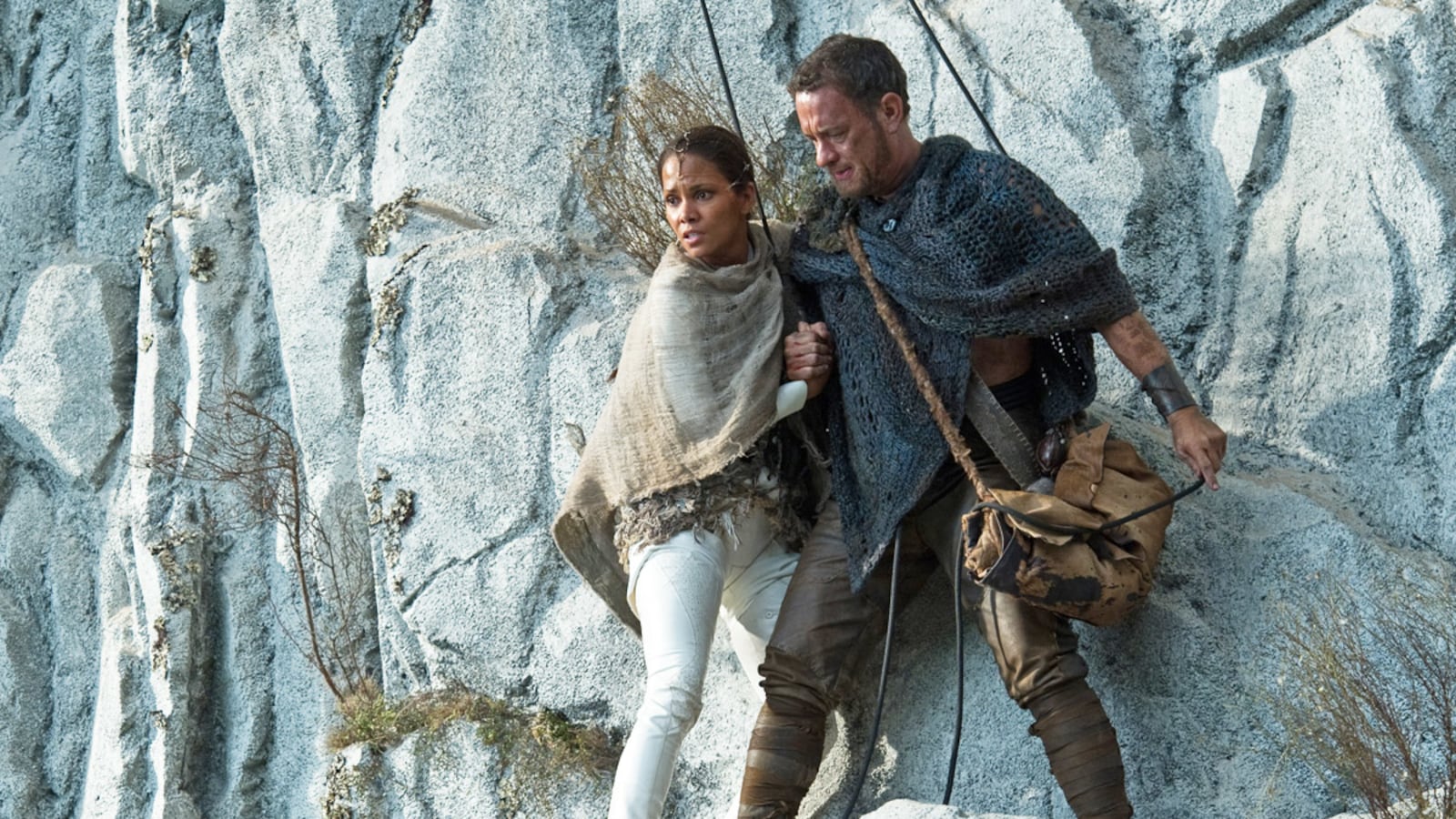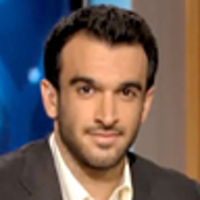One of the most highly anticipated movies of 2012 is Cloud Atlas, a $100 million independently financed epic from Andy and Lana Wachowski—the brains behind the Matrix trilogy—and Tom Tykwer, who directed the hyperkinetic thriller Run Lola Run. Its confounding plot, based on the 2004 novel by David Mitchell, follows six interconnecting storylines throughout six different time periods, as well as its gimmick of casting the same actors—Tom Hanks, Halle Berry, Susan Sarandon, Hugh Grant, and Jim Broadbent, among them—in a variety of different roles (and prosthetics). Needless to say, the film is heavily dividing critics. It is set in, in no particular order: a ship traveling across the Pacific in 1850; 1930s Europe; 1970s-era California; London in the early 2000s; Neo Seoul, Korea, in the year 2144; and a post-apocalyptic Hawaii.
So, is Cloud Atlas a filmmaking breakthrough or total bust? Ramin Setoodeh says it’s a disaster, while Marlow Stern thinks it’s captivating.
Ramin: Cloud Atlas, which clocks in at 164 (!!) minutes, plays like the zaniest TV pilot that Hollywood never made. Or, it’s like someone decided to remake The Hours, while channeling the spirit of Waterworld. Or, it’s like The Matrix meets The Master in outer space. OK, I obviously can’t describe this movie, but neither can anybody else. As this overstuffed special-effects extravaganza begins, we’re introduced to a series of different characters in various lands and eras. Broadbent, playing a book publisher, makes an opaque point about storytelling that resorts to flashbacks and flash-forwards. Then we pan to Berry, in a cab, as a '70s-era reporter who suddenly blurts out: “What the fuck am I here for?” And that, to me, best captures the essence of Cloud Atlas. The end!
Marlow: Reductionism at its finest! But no, I have to disagree with your analysis here. Unlike The Hours, it’s not a pseudo-feminist snooze-fest awash in drab colors, and unlike Waterworld, the film never stumbles into “camp” territory. Because it follows six interconnecting story lines that weave throughout different time periods, it’s a complicated tapestry, for sure. And the Neo Seoul segment, arguably the film’s most compelling thread, does bear some similarities to the Wachowskis’ previous franchise—with the futuristic special effects, messianic savior Sonmi-451 (played brilliantly by South Korean actress Doona Bae), and, well, the name “Neo” in it. But I found every story line nothing short of compelling, save the Hawaii one, where Hanks was haunted by an apparition of Hugo Weaving dressed like the horror villain in The Leprechaun whilst dodging cannibal Grant in tribal makeup, and speaking oddball broken English to Berry. That was pretty messy. But this film is about the sum of its parts and, taken as a whole, it’s a wildly ambitious, visceral experience. I’m curious: did you take issue with the same-actors-playing-different-characters’ shtick?
Ramin: Of course I did! Was it a budget-cutting measure? Because it’s distracting and confuses the stories, to the point where you don’t know who is who and what and where and how. You know, all the basic fundamentals of storytelling are completely ignored. Besides that shortcoming, though, let’s go back to your camp argument, which you’re about to lose. There’s a scene, set in the Leprechaun time period, where Hanks is playing a future caveman and Sarandon wanders around in tribal makeup and Berry hovers nearby doing a Star Trek impersonation, and it’s like, what? Has a movie ever used so many Oscar winners so badly before? Under all those pounds of makeup, these great actors aren’t even allowed to act, or embody characters that remotely resemble humans (or aliens) or whatever. I actually thought the younger cast members fared better, like Ben Whishaw, Jim Sturgess, and Doona. Then again, as I look at her IMDb page, I see that she plays the roles of Tilda, Megan’s Mom, Mexican Woman, Sonmi-451, Sonmi-351, and Sonmi Prostitute. If you’re confused by that, like I was, then Cloud Altas is probably not the movie for you.
Marlow: Well, now that you bring up the budget, you do have to admire the fact that the directing trio of the Wachowskis and Tykwer got this crazy film independently financed for $100 million. That’s a hell of a feat in today’s Hollywood. But look, the post-apocalyptic Hawaii thread is definitely the most problematic. And the idea to have the same actors play different characters—you could also call it Fifty Shades of Makeup—could be confusing to some. You need to suspend disbelief when viewing this film, I believe. These arguments I’m hearing against the costumes and makeup sound a lot like the ones levied against Angelina Jolie when she darkened her skin and sported a curly wig to portray Mariane Pearl in 2007’s A Mighty Heart. Her performance was great, and, in my opinion, the onus was on the audience to be able to suspend disbelief. I thought the performances—save the Hawaii thread—were solid, especially Doona as the replicant/messiah, Sturgess as the Korean rebel fighter/shipwrecked abolitionist, and Broadbent as the incarcerated geriatric. And, if you want to talk about bang for your buck, this epic flick had laser-gun fights in futuristic Korea, a bomb blowing up a plane, a ‘70s-era alleyway chase, a group of disgruntled fogies breaking out of a fascist retirement home, and a German-Jewish Berry circa WWII having sex with a gay composer (Whishaw). Isn’t that alone worth the price of admission?
Ramin: Not if those threads don’t connect. You could YouTube all those topics (and dancing cats) and save yourself three hours and the price of admission. I appreciate directors who take risks, but only if those risks pay off. Cloud Atlas is the most self-important movie that Hollywood has made since—well, The Master, another movie that I hated and you loved. But I think the comparison works (even if the subject matter is so vastly different). While watching both films, you really get a sense that the directors are too busy being edgy geniuses to worry about their audiences. Can we also talk about how clunky the dialogue is? In one scene, Hanks actually says to Berry, “You’ll fall, I’ll catch you.” Is he quoting from an Ingrid Michaelson song?

Marlow: I thought the threads all connected, even though the whole gimmick that the different characters share a similar tattoo was a tad trite. You can call any ambitious or great film “self-important”—and I’m not saying that Cloud Atlas is a “great film,” just a “very good one that people should see.” At nearly three hours, it is a bit of a hike, but once you get to the summit you’ll feel satisfied, and even a little happier in the way that the film, with all its crazy subplots, costumes, and story lines, makes you believe just a morsel more in the inherent goodness of humanity, romance, and the transformative power of filmmaking (sorry, that was pretty grandiose). By tying together all these diverse threads, it achieves what a film like, say, Babel does not, which is to present to us a world without borders where every man, woman, and child is connected by a common thread. The biggest misgiving I have with the film, to be honest, is that the Cloud Atlas Sextet, allegedly the finest orchestral composition ever put to paper according to the film, is basically just a few twinkling keys on the piano, and pales in comparison to Outro by M83, which is used in the incredible (and lengthy) trailer for the film. But this, and others, are just minor quibbles when presented with such a unique, massive, beautiful and enthralling piece of art. It’s never the least bit boring and definitely worth your hard-earned dollars. Oh, and who doesn’t like Ingrid Michaelson? She’s lovely too.







